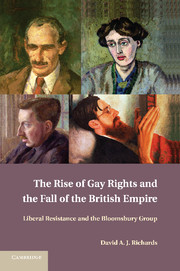 The Rise of Gay Rights and the Fall of the British Empire
The Rise of Gay Rights and the Fall of the British Empire Published online by Cambridge University Press: 05 June 2014
We turn now to the close study of the resistance movement I call gay rights, several of whose British advocates (John Addington Symonds, Oscar Wilde, and Edward Carpenter) drew inspiration from the life and poetry of the American poet Walt Whitman, and two of whom (Wilde and Carpenter) visited, in what can only be called a quasi-religious pilgrimage, a man they regard as the prophet of gay rights. It is not at all surprising that both Wilde and Carpenter should have interpreted Whitman's great poetry collection Leaves of Grass, in particular, the “Calamus” poems, as calling for a new opening to homoerotic experience that was, for Whitman, connected to a more inclusive understanding of democracy. Indeed, I have no doubt this is the best interpretation of the poem, as I have argued at some length elsewhere.
Oscar Wilde made a point of visiting Whitman when he lectured in the United States, telling a batch of reporters, “There is something so Greek and sane about his poetry.” Whitman evidently made no effort, as he would later do with Symonds (whom he never met), to conceal his homosexuality. Wilde later said, “The kiss of Walt Whitman is still on my lips.” Wilde, like Symonds, married and had children, but other than their common Hellenism (which Wilde, a brilliant undergraduate, had imbibed from Walter Pater at Oxford), the similarity ends there. Symonds lived mainly abroad, did not publish his works on homosexuality to a general public in his lifetime, and, even then, the published works did so in a defensive and ambivalent way that certainly was not wholly honest to his convictions. Wilde forged a style of living and writing that explored homosexuality and ironic wit to question and probe the Victorian rigid boundaries of gender and class.
To save this book to your Kindle, first ensure no-reply@cambridge.org is added to your Approved Personal Document E-mail List under your Personal Document Settings on the Manage Your Content and Devices page of your Amazon account. Then enter the ‘name’ part of your Kindle email address below. Find out more about saving to your Kindle.
Note you can select to save to either the @free.kindle.com or @kindle.com variations. ‘@free.kindle.com’ emails are free but can only be saved to your device when it is connected to wi-fi. ‘@kindle.com’ emails can be delivered even when you are not connected to wi-fi, but note that service fees apply.
Find out more about the Kindle Personal Document Service.
To save content items to your account, please confirm that you agree to abide by our usage policies. If this is the first time you use this feature, you will be asked to authorise Cambridge Core to connect with your account. Find out more about saving content to Dropbox.
To save content items to your account, please confirm that you agree to abide by our usage policies. If this is the first time you use this feature, you will be asked to authorise Cambridge Core to connect with your account. Find out more about saving content to Google Drive.